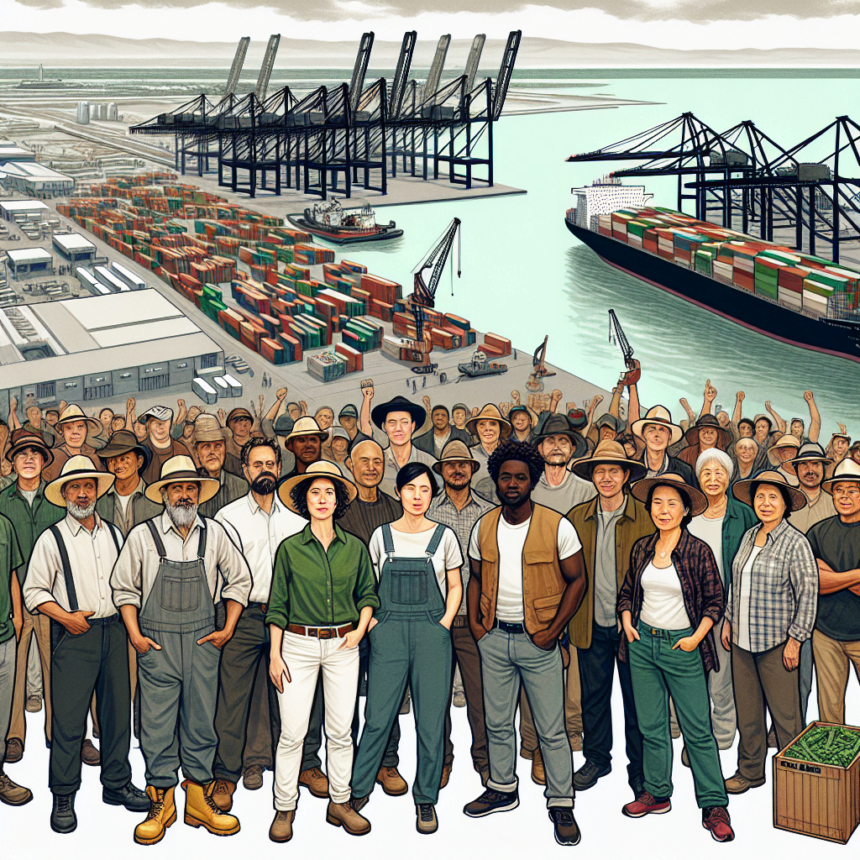Main Points In Hindi (मुख्य बातें – हिंदी में)
-
बंदरगाहों पर हड़ताल की आशंका: कृषि संगठनों ने व्हाइट हाउस से आग्रह किया है कि वह अमेरिका के पूर्वी और खाड़ी तट के बंदरगाहों पर संभावित हड़ताल को रोकने के लिए कदम उठाए, क्योंकि ये बंदरगाह लगभग आधे समुद्री व्यापार को संभालते हैं और इससे अमेरिकी कृषि और अर्थव्यवस्था को नुकसान हो सकता है।
-
आर्थिक प्रभाव: रिपब्लिकन सीनेटर टेड क्रूज़ के अनुसार, बंदरगाहों पर हड़ताल से अमेरिकी अर्थव्यवस्था को प्रतिदिन 5 बिलियन डॉलर का नुकसान हो सकता है, विशेष रूप से खाद्य उत्पादों जैसे कॉफी, मांस और अंडों के विपणन पर प्रभाव पड़ेगा।
-
समुद्री शिपिंग नेटवर्क पर खतरा: यदि हड़ताल होती है, तो न्यूयॉर्क, न्यू जर्सी, सवाना, और नॉरफ़ॉक जैसे अन्य प्रमुख बंदरगाह भी प्रभावित होंगे। पहले से ही कमजोर समुद्री शिपिंग नेटवर्क को और भी अधिक परेशानी का सामना करना पड़ सकता है।
-
आर्थिक और कृषि निर्यात का नुकसान: हड़ताल से अमेरिका के जलजनित कृषि निर्यात का लगभग 14% खतरे में पड़ सकता है, जिससे आर्थिक प्रभाव $318 मिलियन प्रति सप्ताह अनुमानित है।
- उपभोक्ताओं पर प्रभाव: हड़ताल के परिणामस्वरूप किराने की कीमतों में वृद्धि और प्रमुख कृषि उत्पादों की निर्यात बिक्री में कमी आ सकती है। अमेरिकी उपभोक्ताओं को कुछ लाभ मिल सकता है, लेकिन कॉफी और कोको की कमी के कारण यह लाभ सीमित हो सकता है।
Main Points In English(मुख्य बातें – अंग्रेज़ी में)
Here are the main points from the article:
-
Call for Action Against Potential Port Strikes: Agricultural organizations have urged the White House to take action to prevent potential strikes at major ports on the East and Gulf coasts of the U.S., which handle about half of the country’s maritime trade, including key consumer products like coffee, meat, and eggs.
-
Economic Impact of Strikes: Republican Senator Ted Cruz highlighted concerns that a port strike could result in a daily loss of $5 billion to the U.S. economy, noting that the country is on the verge of its first union strike at these ports since 1977.
-
Current Contract Expiration and Union Negotiations: The current contract between the International Longshoremen’s Association and employers is set to expire on September 30, and negotiations are at a standstill, which could lead to significant disruptions in port operations.
-
Potential Supply Chain Disruptions: A strike could severely affect various U.S. industries and lead to higher prices for basic goods, as approximately 14% of the nation’s aquatic agricultural exports and 53% of imports could be endangered, translating into an estimated economic impact of $318 million over a week.
- Consumer Effects and Market Adjustments: While U.S. consumers might benefit from lower prices for perishable goods if diverted to domestic markets, there could be shortages of items like coffee and cocoa due to extended strikes, potentially leading to increased grocery prices overall.


Complete News In Hindi(पूरी खबर – हिंदी में)
संक्षेप में: संभावित हड़ताल के बीच अमेरिकी कृषि और अर्थव्यवस्था की चिंताएँ
हाल ही में, कृषि संगठनों ने व्हाइट हाउस से निवेदन किया है कि वह अमेरिका के पूर्वी और खाड़ी तट के बंदरगाहों पर संभावित हड़ताल को रोकने के लिए कार्रवाई करे। ये बंदरगाह देश के लगभग आधे समुद्री व्यापार को संभालते हैं, जिसमें कॉफी, मांस और अंडे जैसे प्रमुख उपभोक्ता उत्पाद शामिल हैं। संगठनों में अमेरिका फार्म ब्यूरो फेडरेशन, रिन्यूएबल फ्यूल्स एसोसिएशन, और अमेरिकन केमिस्ट्री काउंसिल जैसे समूह शामिल हैं। इन समूहों का कहना है कि पूर्वी और खाड़ी तट के बंदरगाहों पर श्रमिकों के वेतन को लेकर जो गतिरोध उत्पन्न हुआ है, उसके परिणामस्वरूप अमेरिकी कृषि और अर्थव्यवस्था को गंभीर नुकसान हो सकता है।
टेक्सास के रिपब्लिकन सीनेटर टेड क्रूज़ ने चेतावनी दी है कि बंदरगाहों पर हड़ताल से अमेरिकी अर्थव्यवस्था को प्रतिदिन 5 बिलियन डॉलर का नुकसान हो सकता है। वर्तमान अनुबंध 30 सितंबर को समाप्त हो रहा है, और यदि श्रमिकों के बीच मुद्दों का समाधान नहीं होता है, तो हड़ताल की स्थिति उत्पन्न हो सकती है। ह्यूस्टन और अन्य व्यस्त बंदरगाहों पर काम बंद होने की आशंका है, जिससे समुद्री शिपिंग नेटवर्क प्रभावित होगा।
अंतर्राष्ट्रीय लॉन्गशोरमेन एसोसिएशन, जो 45,000 बंदरगाह श्रमिकों का प्रतिनिधित्व करती है, और यूनाइटेड स्टेट्स मैरीटाइम अलायंस के बीच चल रही वार्ता में कोई ठोस प्रगति नहीं हुई है। इस हड़ताल के परिणाम स्वरूप, अमेरिकी कंपनियां वैकल्पिक उपायों की तलाश कर रही हैं।


व्हाइट हाउस ने कहा है कि वह अमेरिकी आपूर्ति श्रृंखलाओं पर पड़ने वाले प्रभावों का आकलन कर रहा है, लेकिन हड़ताल को रोकने के लिए टैफ्ट-हार्टले अधिनियम को लागू करने का कोई इरादा नहीं है। हड़ताल के चलते मांग और आपूर्ति के मामलों में गंभीर प्रभाव पड़ सकता है, जो खुदरा, विनिर्माण और खाद्य उद्योगों पर गहरा असर डालेगा।
संभावित हड़ताल के परिणामस्वरूप अमेरिका के सभी जलजनित कृषि निर्यातों में से लगभग 14% प्रभावित हो सकते हैं, जिससे एक सप्ताह में निर्यात का अनुमानित मूल्य $318 मिलियन होने की संभावना है। हड़ताल का खतरा अमेरिका के 53% जलजनित कृषि आयातों को भी प्रभावित कर सकता है, जिससे प्रति सप्ताह 1.1 बिलियन डॉलर का आर्थिक प्रभाव पड़ सकता है।
यदि हड़ताल लंबे समय तक चलती है, तो यह गोमांस, सूअर का मांस, चिकन और अंडे जैसी कृषि उत्पादों की बिक्री में कमी का कारण बन सकती है। हालांकि, घरेलू बाजार में खराब होने वाले उत्पादों के दाम कम हो सकते हैं, जिससे अमेरिकियों को थोड़ी राहत मिल सकती है।
अमेरिकी सीमा शुल्क आंकड़ों के अनुसार, पिछले वर्ष लगभग 5.5 बिलियन अमेरिकी डॉलर के पोल्ट्री मांस उत्पादों में से दो-तिहाई पूर्वी और खाड़ी तट के बंदरगाहों से भेजे गए थे। विशेषज्ञों द्वारा यह बताया गया है कि यदि हड़ताल होती है, तो अमेरिकी उपभोक्ता अंडे और मांस की बिक्री में थोड़े लाभकारी हो सकते हैं, लेकिन कॉफी और कोको के मुद्दों की वजह से ये लाभ सीमित हो सकते हैं।
कुल मिलाकर, अमेरिकी कृषि और अर्थव्यवस्था को संभावित हड़ताल के कारण गंभीर चुनौतियों का सामना करना पड़ सकता है। कृषि संगठनों की अपील के बावजूद, व्हाइट हाउस ने अभी तक कोई ठोस कदम नहीं उठाया है, और इस परिस्थिति का विकास आगामी हफ्तों में देखना होगा।
Complete News In English(पूरी खबर – अंग्रेज़ी में)
On Wednesday, agricultural organizations urged the White House to take action to prevent a potential strike at East and Gulf Coast ports slated for October 1, which handle nearly half of the U.S. maritime trade, including consumer staples like coffee, meat, and eggs. Multiple groups, including the American Farm Bureau Federation, Renewable Fuels Association, and American Chemistry Council, emphasized the urgent need for government intervention to ensure port operations do not halt, thus preventing significant harm to American agriculture and the broader economy.
Republican Senator Ted Cruz highlighted a JP Morgan analysis indicating that a strike could cost the U.S. economy approximately $5 billion per day. He warned that the country is on the brink of its first union strike at East and Gulf Coast ports since 1977. Cruz represents Texas, which includes the Houston port—one of 36 ports currently in labor negotiations, facing a deadlock over workers’ pay issues. Other major ports, such as those in New York, New Jersey; Savannah, Georgia; and Norfolk, Virginia, could also be affected, exacerbating existing vulnerabilities in the maritime shipping network, already strained by attacks on ships near the Suez Canal.
As the risk of a strike looms, American companies reliant on East and Gulf Coast ports are actively seeking alternative solutions. The current contract between the International Longshoremen’s Association Union, representing 45,000 port workers, and United States Maritime Alliance—which handles negotiations for employers from Texas to Maine—expires on September 30.
This strike threat comes just weeks before the U.S. presidential elections, involving Vice President Kamala Harris and former President Donald Trump. However, the White House has not provided any immediate comments on the agricultural groups’ requests. White House spokesperson Robin Patterson stated that they are monitoring and assessing potential impacts on U.S. supply chains related to port operations and will act if necessary. The Biden administration has expressed no intention of invoking the Taft-Hartley Act, a federal law designed to prevent labor strikes.
Delays or costs associated with a strike could rapidly escalate, putting entire sectors—including retail, manufacturing, and food—at risk. Approximately 14% of all U.S. waterborne agricultural exports are threatened by the potential strike, with the Farm Bureau estimating that these exports could be valued at $318 million over a week’s time. Furthermore, 53% of U.S. waterborne agricultural imports are also at risk, which could result in over $1.1 billion in potential economic impact weekly.
A prolonged strike may lead to shortages of familiar goods such as bananas, coffee, and cocoa, causing grocery prices to rise over time. There could also be a decline in export sales for key agricultural products, including beef, pork, chicken, and eggs. However, domestic consumers might benefit if perishable goods are redirected to the U.S. market, as producers adopt a “sell it or smell it” strategy.
According to U.S. Customs data and the USA Poultry & Egg Export Council, around two-thirds of the nearly $5.5 billion in poultry meat products exported last year were shipped from East and Gulf Coast ports. Sterling Smith, the director of agricultural research for Agrisomp North America, noted that American consumers might see marginal benefits in chicken and egg sales but cautioned that issues related to coffee and cocoa could substantially diminish these gains.
Source link








